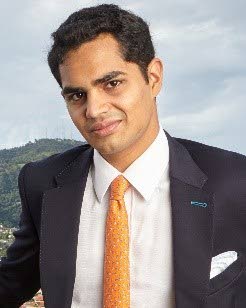Another brick in the wall

Kiran Mathur Mohammed
kmmpub@gmail.com
Some surly, some bouncing off walls; children bring joy and frustration in equal parts. Lunch kits, stationery and the all-hallowed school bag are banged about or artfully arranged. All part of the start of the new term this week.
The world is changing rapidly with increasing automation: the robots are coming. This will require wholesale education reform if we are to adapt.
Before doing so, we must learn to read. The Adult Literacy Tutors Association (ALTA) and the University of the West Indies last reckoned that up to 23 per cent cannot read well enough to go about daily tasks – like reading a medicine label or a newspaper headline.
An estimated 54.8 per cent of the country cannot read this article.
Part of the problem is that many simply cannot see. In 2016, 35.9 per cent of American girls and 29.1 per cent of boys aged six to 17 wore spectacles or contact lenses.
That is much more than in TT, where tens of thousands of children have difficulty seeing and don’t have access to treatment or eyeglasses. In one class in the Beetham, none of the children in a class had any form of eye care at all and at least 26 per cent of them couldn’t see.
The Ministry of Health does visual and auditory screening for all primary-school entrants and vision screening for all Standard Four students. This is good. But they must then be sent to optometrists and receive eyeglasses, which many cannot afford. Waits can be up to four years.
It makes sense for companies and the government to invest. According to the World Health Organisation and Visionspring, a pair of glasses increases monthly earnings by 20 per cent and productivity by 35 per cent. The long-term impact is even greater for children. The private sector can lead with programmes like Warby Parker’s "buy a pair, give a pair."
What else does the data show? Younger children are malleable, curious and willing to try new things. Interventions at a younger age have a much greater impact.
UNESCO’s highest-impact programmes rely on a simple premise. Parents are stressed: exhausted and busy. The best way to improve children’s literacy is to visit parents and provide them with the right parenting and educational tools. Researchers Andrejs Geske and Antra Ozola, among others, have found clear evidence.
A US programme, Reach Out and Read, trains doctors to encourage parents to regularly read aloud to their children. During check-ups, doctors ask parents about reading and provide them with a new children’s book. Parents who had received direct intervention reported were 42 per cent more likely to read with their children at least three days a week. Their children developed larger vocabularies and stronger literacy skills than they otherwise would.
The Jamaica Home Visit Programme had social workers visit parents weekly. During each visit, parents learned to create a simple toy, practised using the toy for play, discussed a key principle of child development, and learned a new song to sing with the children. Twenty years on, children whose parents participated were earning 25 per cent more than otherwise.
Paula Lucie-Smith’s ALTA has also given hope to tens of thousands of adults. When parents can read, they value literacy. This becomes a virtuous cycle. Years after teaching her, Lucie-Smith got a call from a former student proud that her granddaughter was about to attend one of the country’s best secondary schools.
What do all these programmes have in common? They are based on evidence and their impact was measured.
We do have outstanding teachers. I spoke with Ashley Thompson-Steuart, who arranged interactive music and arts sessions to engage Servol students for Global Dignity Day. She was later invited by Norway’s Crown Prince Haakon to share her project experience.
Yet a few committed teachers cannot carry everyone. Eighteen years and more than US$1 billion later, Bill Gates says data is what works. In a recent speech, he shared an experience from an American charter school network, Summit Public Schools. They collected data and determined that English-learners started school behind other students and never caught up. They talked to teachers whose English-learners did best, collated their practices and applied them across their schools. The performance gap narrowed by 25 per cent in under a year.
You never forget your best teachers. I remember blustering around a smart business event, only to come face to face with my prep one teacher. Instantly becoming a four-year-old, I was reduced to mumbling a meek: “Hullo, Ms Cadiz,” We can support teachers like them, and use data to bring out the best in our parents and children.
Kiran Mathur Mohammed is a social entrepreneur, economist and businessman. He is a former banker, and a graduate of the University of Edinburgh.


Comments
"Another brick in the wall"